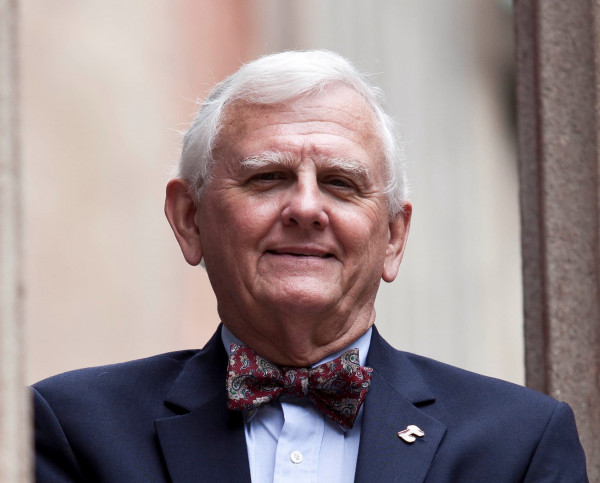College of Charleston medical alumni answer common COVID vaccine questions
February 8, 2021With the arrival and distribution of two (soon to be three) COVID-19 vaccines, there is light at the end of the pandemic tunnel, but this is not the time to let down our guard just yet since the majority of Americans won’t get their shots until spring.
Three College of Charleston alumni working in the field of medicine recently answered questions about the COVID vaccine rollout and when we might see the waning days of the pandemic. Dr. Robert T. Ball ’66, an infectious disease consultant and epidemiologist based in Charleston, Dr. Michael T. Finch ’86, a Columbia-based pediatrician and current president of the South Carolina Medical Association, and Dr. Toya Pound ’91, medical director for the Medical University of South Carolina’s East Cooper Women’s Center each weighed in.

Dr. Robert T. Ball ’66, an infectious disease consultant and epidemiologist based in Charleston.
Dr. Ball:
How long does it take for the vaccine to work and give you immunity after the booster shot?
Current COVID vaccines induce several types of immunity, usually within 7-10 days of the first shot, probably lasting for at least several months (longer in many folks). The one-month booster increases immunity duration to at least 6-9 months (that’s as long as this metric has been studied so far). Current ongoing research for longer duration is limited by the brief timeline (less than one year) studying current vaccines. More vaccines will soon be available, and all undergo rigorous safety and efficacy testing (no shortcuts) before they are given Emergency Use Authorization (EUA) by the U.S. FDA. All current vaccines have been shown to prevent severe COVID in recipients, although there are no data yet for prevention of asymptomatic infection and transmission.
When do you expect the COVID crisis to be completely over?
The current 2020-2021 SARS-CoV-2/COVID pandemic likely will become, gradually over the next few years, another common contagious human coronavirus background infection but needing vaccine boosters (much like annual influenza vaccines), since SARS-CoV-2 constantly mutates (like influenza). Protective global or USA “herd immunity” is highly unlikely to occur in 2021 or even 2022 (for a wide variety of reasons). Hopefully, future COVID vaccines will be made to provide better and longer-lasting immunity, and/or this virus may mutate to a less lethal variant.
What pandemic habit will you keep?
I (and most science-based people) will, even with current COVID vaccinations, need to continue mask wearing, distancing and frequent hand-washing (much like some East Asian countries) when in public, at least for the near future.
If we can get a COVID vaccine with 95 percent effectiveness, why can’t we get a flu vaccine with that kind of protection?
Almost all influenza vaccines are sadly made with now-outdated technology (egg-based), but will soon use the new COVID-vaccine manufacturing platforms for future doses, which hopefully will provide much better protection (and even longer-lasting than just annual).

Dr. Michael T. Finch ’86, a Columbia-based pediatrician and current president of the South Carolina Medical Association.
Dr. Finch:
If someone already had COVID, should they still get the vaccine?
Yes, they should still get the vaccine even if they have had COVID-19. The thought is that the vaccine may provide longer and broader protection against some possible mutations of the virus than one’s own antibodies that are made from the illness. Better to be “double protected,” if you will.
When will I be able to sit in a restaurant or movie theater and not worry?
I am hopeful we will be able to sit in a restaurant or theater and not worry by the summer of 2021. The idea is that we need to make every effort to get upwards of 80 percent of the population immunized to obtain “herd” immunity, then the risk to all of us falls dramatically. I suspect face masks will be around for a while, like them or not, as folks feel more secure with them.
Will you ever shake hands again?
I wouldn’t be a born and bred Southerner if I didn’t say that I think handshakes will return. I sure hope so. My feeling is it will return also as we get closer to the herd immunity mark and the large majority of folks are vaccinated. Fist bumps and elbow bumps will have to end at some point, surely!
Will there be another pandemic any time soon?
This one is very hard to answer. We have not seen a pandemic of this magnitude since the influenza pandemic of 1918. I surely hope it will be another 100 years before we have to go through something like this again, so we won’t be around to have to worry about it. I hope that many of the lessons learned worldwide with the COVID-19 pandemic will have us better prepared to contain any future disease outbreaks of this type before they can spread like this one did.

Dr. Toya Pound ’91, medical director for the Medical University of South Carolina’s East Cooper Women’s Center.
Dr. Pound:
Do I think life will ever return to normal?
That is an interesting question. Life will obviously never be exactly how it was before the pandemic, but I do think that it will return to a new version of normal. I think that we will have large gatherings again and be able to celebrate holidays with our families again. At some point we will be able to put away the masks. When that will be is the question …
Is there any good to come out of the pandemic?
Yes. I think that we have all been able to spend more time with our immediate families and neighbors. I think we have been able to enjoy the simple things in life again – like going for picnics and riding a bike. I think we have also learned not to take for granted the ability to go to a concert and gather with our friends. We have also, in the scientific community, learned a lot about the spread and treatment of COVID, which will translate to knowledge about how better to address other health issues.













